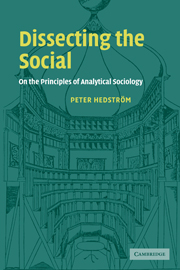Book contents
- Frontmatter
- Contents
- List of figures
- List of tables
- Preface
- 1 The analytical tradition in sociology
- 2 Social mechanisms and explanatory theory
- 3 Action and interaction
- 4 Social interaction and social change
- 5 On causal modelling
- 6 Quantitative research, agent-based modelling and theories of the social (with Yvonne Åberg)
- 7 Coda
- References
- Index
2 - Social mechanisms and explanatory theory
Published online by Cambridge University Press: 22 September 2009
- Frontmatter
- Contents
- List of figures
- List of tables
- Preface
- 1 The analytical tradition in sociology
- 2 Social mechanisms and explanatory theory
- 3 Action and interaction
- 4 Social interaction and social change
- 5 On causal modelling
- 6 Quantitative research, agent-based modelling and theories of the social (with Yvonne Åberg)
- 7 Coda
- References
- Index
Summary
In this chapter I argue for the importance of a specific kind of abstract analytical theorizing that differs from many other types of sociological theorizing in its focus on social mechanisms. A social mechanism, as defined here, is a constellation of entities and activities that are linked to one another in such a way that they regularly bring about a particular type of outcome. We explain an observed phenomenon by referring to the social mechanism by which such a phenomenon is regularly brought about.
The purpose of the chapter is threefold. First, I very briefly discuss different notions of theorizing within contemporary sociology. Sociology is a fragmented discipline and theorizing means different things to different sociologists. Second, I consider at some length what ‘explanation’ entails. Sociologists differ not only on what they consider to be the objective of theorizing, but also on the meanings they attach to the concept of ‘explanation.’ Third, I discuss in some detail the main thrust of the mechanism-based approach developed here.
As this brief synopsis indicates, in this chapter I touch upon a range of difficult problems related to causation and explanation. It goes without saying that a discussion of such vast and difficult problems runs the risk of being perceived as shallow. But the purpose of the chapter must be kept in mind. My intention is not to contribute to the theory of explanations or to the philosophy of the social sciences.
- Type
- Chapter
- Information
- Dissecting the SocialOn the Principles of Analytical Sociology, pp. 11 - 33Publisher: Cambridge University PressPrint publication year: 2005
- 1
- Cited by



